07/05/18
K-State Current - July 5, 2018
K-State Current is a weekly news update for the Kansas Board of Regents to apprise the Regents on a few of the many successes and achievements made by K-State faculty, staff and students.
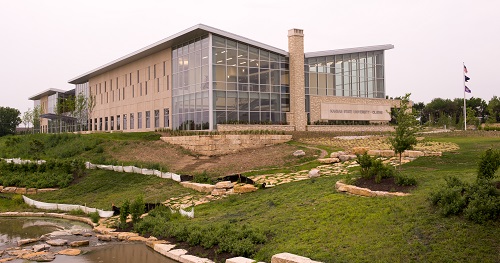
K-State News
Kansas State Polytechnic receives FAA's first waiver to a university to fly UAS beyond line of sight
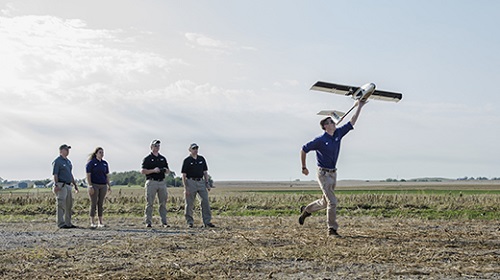
Kansas State University Polytechnic Campus has received a waiver from the Federal Aviation Administration to fly unmanned aircraft systems beyond the line of sight. It's the first such waiver granted to a university by the FAA.
The FAA certificate to Kansas State Polytechnic's Applied Aviation Research Center waives the rules regarding visual sight of aircraft operations by the pilot and visual observers. This allows Kansas State Polytechnic to conduct research and operations where pilots and observers can no longer see their aircraft.
"These operations and research will provide valuable insight into regulation and safety measures for UAS in the national airspace," said Travis Balthazor, Kansas State Polytechnic's UAS flight operations manager. "At the time of notification to us, the FAA's website showed only 20 waivers to this regulation, and only half are waived to allow small UAS operations where the remote pilot in command and the visual observers may not be able to see the aircraft."
Balthazor called the waiver a significant first step in Kansas State Polytechnic's efforts to further develop the safety case for longer range small UAS operations.
"We have been working deliberately over the last two years to demonstrate our ability to safely adhere to the standards set forth in our waiver," Balthazor said.
Kurt Carraway, the Applied Aviation Research Center's UAS executive director, emphasized the importance of this waiver to K-State Polytechnic's research and partnership with the FAA in integrating UAS into the national airspace system.
"This is a significant step in meeting our strategic goals of incorporating sound research and a safety centric approach to UAS operations to help the industry and the FAA continue to integrate UAS into the national airspace system," Carraway said. "We are pleased to have been a partner with PrecisionHawk in their Pathfinder II project, which gave us some of the baseline experience we needed to make the safety case."
Kansas State University is a member of the Kansas UAS Joint Task Force and a key partner with the Kansas Department of Transportation, which was recently named one of 10 entities nationwide to be part of the FAA's UAS Integration Pilot Program.
"This waiver is an initial component of the 'crawl, walk, run' aspect of our approach to larger-scale beyond-the-line-of-sight operations," Carraway said. "In addition to our efforts affiliated with the Kansas Department of Transportation's Integration Pilot Program, we will offer flight operations training and consulting to help other entities gain similar waivers. This is consistent with the Kansas State University land-grant mission of transferring our knowledge to promote the greater good of the industry."
Kansas State Polytechnic was recently named third-place winner in the training and education category of the 2018 XCELLENCE Awards by the Association for Unmanned Vehicles Systems International. This award recognizes the valuable training offered and effect K-State Polytechnic has on the UAS industry. Kansas State Polytechnic offers a variety of UAS training courses, including a law enforcement specific flight training course.
Bill Spiegel receives environmental education recognition
Bill Spiegel, K-State's recycling supervisor, was recently recognized by Rachel Wahle, educational program specialist for the Kansas Association for Conservation and Environmental Education, and Amanda Campanella, USD 383 representative, for outstanding community involvement in sustainability measures.
Rachel Wahle, educational program specialist for the Kansas Association for Conservation and Environmental Education, and Amanda Campanella, USD 383 representative, for outstanding community involvement in sustainability measures.
Spiegel discussed environmental education procedures that affect the community with the USD teachers and science technology, engineering, mathematics, or STEM, students. Spiegel also discussed procedures that include the basic recycle material such as paper and plastics, and additional items such as soil and e-waste material. This education process is aiding them in completing the Kansas Green School Program for 2018.
Horticulture faculty, students helping growers in Tanzania reduce food loss
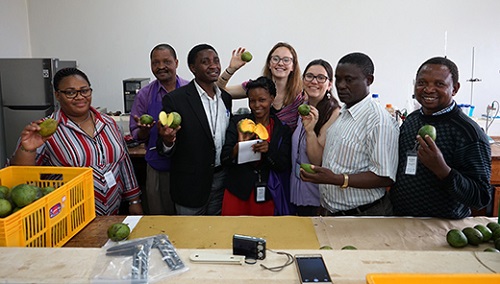
Horticulture faculty and graduate students at Kansas State University's Olathe campus are collaborating with the University of Florida to provide Tanzanian farmers, traders, marketers, students and agriculture extension educators who work with fresh produce get the resources necessary to improve the quality and shelf life of their produce and reduce postharvest losses.
Eleni Pliakoni, assistant professor of urban food production and postharvest handling, and Kelly Gude, doctoral research student in horticulture with an emphasis in postharvest physiology, Kansas City, Missouri, spent May 14-18 in Morogoro, Tanzania, at Sokoine University of Agriculture. There, they led a short course on postharvest handling of fresh fruits and vegetables for 30 local extension educators. Topics included washing, storing, packing, transporting and protecting fresh fruits and vegetables. The participants, who act as extension agents, will teach the information they learned to local growers. The goal is that growers will use the new information and techniques to reduce the large amount of fresh produce that is typically lost after harvest and to improve the quality of produce sold to consumers at open air markets or exported to neighboring countries.
These "train the trainer" workshops are part of a $500,000 project led by Kansas State University in collaboration with the University of Florida, University of California-Davis and Sokoine University of Agriculture in Morogoro, Tanzania. It is funded by the U.S. Agency for International Development's Feed the Future Horticulture Innovation Lab at the University of California-Davis.
Under the partnership, four week-long short courses will be taught in Tanzania — two to extension educators and two to growers. Topics cover a broad range of postharvest loss issues. Courses are meant to start an open dialog with local growers and introduce new ideas as well as potential solutions to Tanzania's food loss challenges.
Researchers also are working with Sokoine University to develop a master's degree program in horticulture with an emphasis in postharvest handling. Kansas State University is developing two courses on postharvest physiology and postharvest handling and technology for the upcoming program. Sara Gragg, assistant professor of animal sciences and industry, is helping with graduate course development.
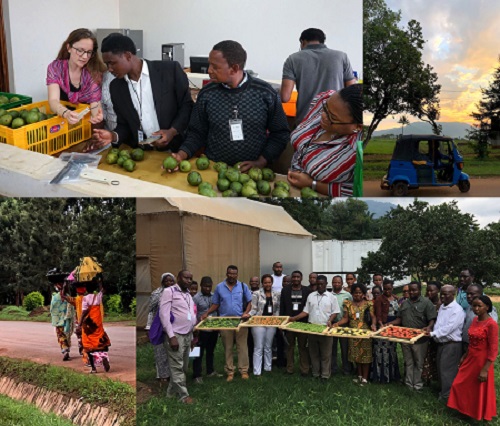
Food loss is one of the largest strains on Tanzania's food system, Gude said.
"The estimated magnitude of postharvest losses in Tanzania is around half of the freshly grown fruits and vegetables and is usually happening before the produces reaches the consumer," Gude said. "In the U.S., only a small percentage of food waste happens during production and postharvest. Most of the waste happens at the consumer level due to things such as over-purchasing fresh food or the food being thrown away because it is not aesthetically pleasing."
Other food production and postharvest-related challenges include cooling, storage, transportation and preventing and managing pests as well as wildlife, such as monkeys and hippopotamuses.
"Many of these challenges are bigger than what we can address in these sessions," Gude said. "For example, food is often transported by bicycle or on someone's head. Those are the modes of transportation that are integrated into their culture, so we can't tell residents not to do that. Instead, we're trying to work within their culture and suggest things like a liner or some sort of buffer to reduce produce damage and contamination."
Challenges also extend to how food is packaged and sold at markets, Gude said. Currently, commodities are sold by unit rather than weight and are often packaged in large bamboo baskets. This leads to produce getting bruised and ripe fruits being packed with immature or overly ripe fruits — which decreases the shelf-life of all the bundled fruits — because sellers are more concerned about quantity rather than quality of the produce.
U.S. collaborators are seeing results from the project, though.
After teaching short courses about packaging and produce maturity, Pliakoni and Gude challenged the extension educators to sort various commodities of different maturities and qualities and then present their findings to the larger group. The extension trainers used the maturity and quality index resources that were presented earlier in the day to sort the commodities into groups.
Earlier this year, Sokoine University also constructed a horticulture pack-house from shipping containers so that theory learned in the classroom could be applied to real-life practice. The pack-house was built as part of the project and includes a wash station for produce, a sorting and packing facility and two large spaces for cooling and storage. Modified campus infrastructure included outfitting a postharvest lab with attached cold storage area. Gude alone traveled with more than 120 lbs. of equipment and material for the lab and short courses to Morogoro, Tanzania.
In August, Kostas Batziakas, doctoral research student in horticulture with an emphasis in postharvest physiology, Greece, will lead a second week-long session for trainers in Tanzania alongside the University of Florida collaborator, Steve Sargent, professor and extension postharvest specialist.
Cary Rivard, associate professor of horticulture and natural resources, extension specialist and director of the Horticultural Research and Extension Center, will help lead one of the workshops for growers scheduled for 2019.
K-State Faculty Highlights
Engineering professor named outstanding manufacturing engineer
Peter Zhang, Kansas State University assistant professor of industrial and manufacturing systems engineering, has been named one of 18 Outstanding Young Manufacturing Engineers for 2018 by the Society of Manufacturing Engineers. 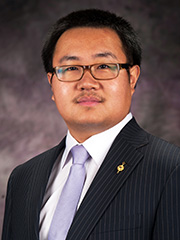
Awardees, who must be age 35 or younger, are recognized for their exceptional contributions and accomplishments in the manufacturing industry. The society has supported the manufacturing industry for more than 85 years, working closely with manufacturing professionals, companies, educators, schools and communities to share knowledge and resources that generate solutions to manufacturing industry challenges.
Zhang received his doctorate in industrial engineering from K-State in 2014 and bachelor's degree in mechanical engineering from Dalian University of Technology, China in 2009. His research is focused on advanced manufacturing processes and their application in bioenergy, aerospace materials and healthcare. His research findings have generated more than 60 publications.
A passionate educator in the manufacturing field, he has taught manufacturing courses to more than 150 students every semester in the College of Engineering since 2015. Zhang's research and education activities have been supported by the National Science Foundation through four grants, and he has provided research experiences for more than 10 undergraduate students to participate in different NSF projects.
K-State Student News
Interior design student wins people's choice award at international convention
Meredith Verzino, senior in interior design, along with four other students from different universities, won the 2018 People's Choice Award for a project that was presented at an international conference in June.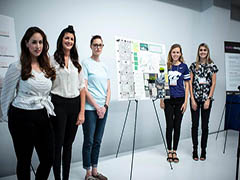
Verzino competed in the IIDA Student Design Charette at the annual NeoCon conference along with Sarah Love, University of North Texas; Dawn Turner, Art Institute of Pittsburgh-Online; Stephanie McShane, New England Institute of Technology; and Esteffany Inzunza, San Diego Mesa College. Competitors in this challenge are nominated by their respective schools and then joined into teams at the conference.
The charette, which is an intense collaborative session in which a group of designers draft a solution to a design problem within a limited time frame for presentation, challenged teams of five with a design problem. The teams were given six hours to determine a design solution, develop a presentation and pitch their concept to a panel of judges. They were given specific deliverables that must be provided in the presentation along with a few supplies for visual representation.
"Meredith has set clear professional goals for herself and demonstrates a consistent commitment to work," said Migette Kaup and Michael Dudek, professors of interior design. "We were proud to have her represent the Kansas State University interior design program at the IIDA event this year. Her participation in NeoCon gave her a well-rounded professional practice experience."
"Competing in the IIDA Student Design Charette was exhilarating and one of the best learning experiences IIDA and NeoCon provides to future professional designers," Verzino said. "During the competition, we had to make quick decisions, play on people’s strengths and inspire creativity within a group which resulted in an excellent project."
Kaup further explained the importance of NeoCon for students.
"Every year, NeoCon provides a forum for the latest products and innovations as well as professional networking and continuing education," Kaup said. "This is a perfect place for emerging professionals and students to take advantage of the opportunity to network and engage with practitioners from across the U.S. and around the world."
"This was my second time at NeoCon and I am inspired by the design field improving each year in providing interior products that support human health and protect our natural environment," Verzino said. "As a future interior designer, NeoCon exposed me to the endless possibilities of interior products, career opportunities and social connections."
NeoCon is hosted every June at The Mart in Chicago. The event is the world's leading platform and most important event of the year for the commercial design industry. The show serves as a launching pad for the iconic brands and products in the commercial design world. NeoCon has evolved into an international design hub that brings together more than 50,000 industry professionals for networking opportunities as well as dynamic and diverse learning experiences.